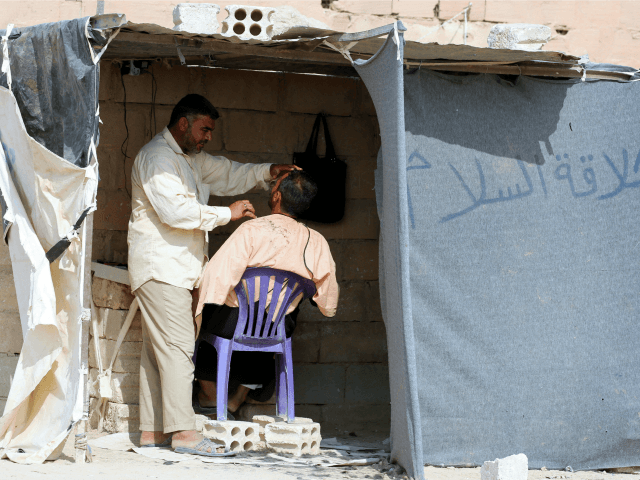MOSUL, Iraq (Reuters) – The only shop to open so far after the army fought its way into the Intisar district of eastern Mosul is Ali Bashar’s barbershop. Inside, men were lining up to shave off the long beards they had been forced to wear under Islamic State.
A few blocks away, four bodies of Islamic State fighters lay on the road, covered with blankets and swarming with flies. A police officer said they had been rotting there for 10 days, waiting for the army to remove the corpses.
Life has not yet returned to anything like normal in one of the first slivers of Islamic State’s last bastion in Iraq to be recaptured by the army.
But residents moved freely through streets dotted with white flags of surrender, which they had raised to protect their homes as the army advanced. A young boy fetched cooking gas for his father. Children skipped around a dirt berm, not flinching at the sound of gunshots and blasts.
A 100,000-strong alliance of Iraqi forces, backed by U.S.-led coalition airstrikes, has almost surrounded Mosul. So far the jihadists’ defenses have been breached only in the east of the city.
Elite counter-terrorism forces have retaken several districts just north of Intisar, but military officers say a heavy presence of civilians in built-up areas is slowing their troops’ advance.
Tan army humvees were parked outside the barber shop, which had reopened over the weekend. Residents and a few soldiers packed into the narrow storefront on Monday. It was not clear how many were waiting for a trim and how many taking cover from the occasional gunfire outside.
But the buzzing of electric trimmers and chirping of scissors spoke volumes, in a city where the ultra-hardline jihadists had ordered mandatory long beards as one demonstration of their control over all aspects of life in the two and a half years since they proclaimed their caliphate from a Mosul mosque.
Black wisps of hair dotted the tiled floor. Beards were trimmed down to stubble or sliced off cleanly with straight razors.
“When they first came, they forbade cutting beards, then they prohibited using razors or thread, and then it was beard styling. Each day they would prohibit something new,” said Bashar, the barber, describing life under Islamic State.
He exhibited a flyer which the jihadists had distributed outlining those restrictions in detail. He said he had stopped working after Islamic State’s morality police detained him briefly for shaving a design into a patron’s beard, a popular style in much of Iraq.
Eleven days after the military announced that its forces had entered the Intisar district, a colonel said on Monday the army had finally secured control of the entire area and advanced towards nearby Salaam neighborhood.
It was difficult to confirm the extent of army control during a Reuters visit to the area. Another officer told Reuters mortars continued to land there, and snipers were still within firing range.
FIREWOOD
Apart from the barbershop, nothing else is open. Shops have so far been unable to stock their shelves, so civilians rely on daily distributions of foodstuffs from the military. Some residents said aid had yet to reach them.
“There are no doctors here. If someone is shot, he will die in his house,” said Saad, a 22-year-old student. As he spoke, a large explosion from deeper inside Mosul shook the ground.
Moments later, a Humvee carrying a wounded soldier from the frontline dashed to a first-aid station at the edge of the city.
Back at the barber shop, a resident scooped up two empty wooden ammunition boxes discarded by the army. They would make good tinder for his cooking fire, he said.
The man, who declined to be named, had pulled his children out of school under Islamic State. There were few jobs in the group’s self-styled caliphate, he said.
“If you wanted to work, you had to join them.”

COMMENTS
Please let us know if you're having issues with commenting.